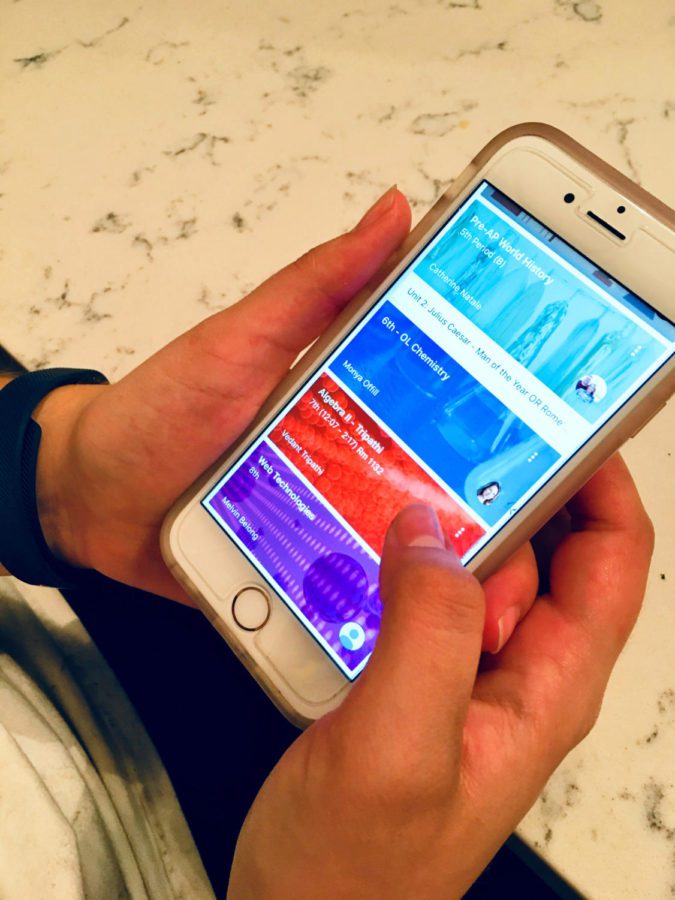Technology does not teach, teachers do
Junior Madison Medeiros works on Google Classroom, a program slowly taking over schools. According to The Washington Post, 90 percent of teachers believe technology like this is creating easily distracted generations. “Our teachers are important,” columnist Haley Medeiros said in the attached technology column. “They need to be able to motivate their students and truly teach – without getting replaced by a machine.”
September 16, 2018
Let’s face it and place it. “Motivating” and “school” aren’t normally used in the same sentence. It’s not that teachers aren’t inspiring. It’s that most high schoolers don’t find doing schoolwork all that interesting.
However, many educators and school officials make the assumption that since technology makes the classroom, supposedly, more efficient, students are automatically engaged in the lesson. After all, with programs like Google Classroom, Quizlet, and online planners, it seems we have the whole educational world right at our fingertips. While technology is great when used in moderation, the question has to be asked: Is there too much technology in our classrooms?
According to The Washington Post, 90 percent of teachers said that technology in the classroom creates easily-distracted generations with short attention spans. With search engines like Google, students can easily look up answers and get what they need to know in less than five minutes. After that, zoning out and an excessive amount of yawning is all some students get out of class.
Most Prosper classes start with the line, “Grab your Chromebooks,” followed by an assignment posted on Google Classroom. These assignments continue for most of the class period, until a few minutes to the end of class, which is when we are told to put up our Chromebooks. The whole hour and 30 minutes of class time is mostly dedicated to online classwork.
The Washington Post also said 60 percent of teachers saw that digital education is affecting their students’ ability to write and have conversations in person. The share mechanism on the Google programs allows no need for interaction with other students.
With this much technology, there’s not much time in the schedule for motivation. Lots of times, it feels like there isn’t even much time for teaching. Students are told to watch a video, read the posted notes and finish the assignment on Classroom. There’s no time in between for going over notes or explanations.
Technology is not to be completely discouraged. It is a helpful tool when it comes to studying, reviewing, taking notes and reinforcing topics. When you can’t remember what a word means, or how to do a certain problem, computers are lifesavers. Despite its convenience, technology shouldn’t be the teacher. Less technology-based lessons will allow teachers to do what they do best. Our teachers are important. They need to be able to motivate their students and truly teach – without getting replaced by a machine.
“Technology is just a tool. In terms of getting the kids working together and motivating them, the teacher is the most important.” – Bill Gates, founder of Microsoft






























Bob Lamm • Sep 16, 2018 at 5:33 pm
This is one of the most depressing articles I’ve read in a long while. That’s not a criticism of Haley Medeiros, who has done an outstanding job.
I’m a writer in New York and teach at NYU. I’m 71 years old. I’ve taught at five universities and two high schools. Obviously, for most of my life, technology wasn’t everything. I’m glad.
The interactions in a classroom between a teacher and students–and among students–are a profound part of education. And I don’t mean text messages during class. (Not that I think text messages are a horror.) I mean people actually TALKING to each other, listening to what others say and how they say it, and verbally exchanging ideas.
Perhaps for certain types of math and science work those interactions aren’t as crucial as in the humanities. But I had terrible science teachers from 7th grade right through to an astronomy class in college–except for my 9th grade science teacher. He was wonderful. So that school year, and only that school year, I loved science class.
Years ago, I had a letter about teaching published in the New York Times. I suggested a very easy way to see how important teaching is. Any student from your high school can easily do this. Ask any adult, from their 20s to their 90s, about the very best teachers they had in younger days and the very worst teachers. Virtually everyone will answer as if it were five minutes ago. That is how powerful the positive (or negative) impact of teacher can be. A great teacher (or a horrible one) can change a student’s life.
I don’t believe any online lesson could have given me what my best teachers did. I’m not against online teaching, but it sounds like something crucial is being lost.
Great column, Ms. Medeiros. I hope it provokes lots of discussion and rethinking.
Bob Lamm